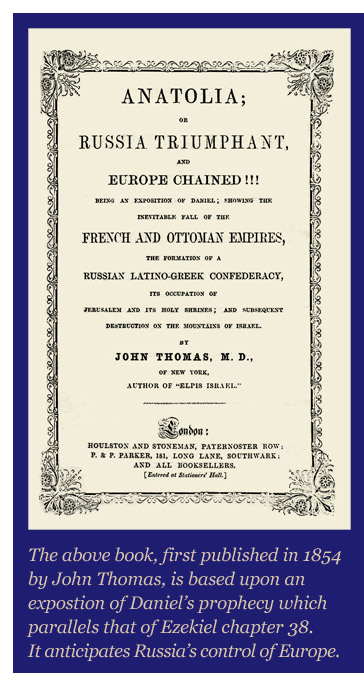
|
The Dispute Between Britain and Iran Escalates
Russia - The King of the North - Backs Iran
|
|
Thursday, March 29, 2007
|
www.bibleinthenews.com Audio & Print versions
|
"At the time of the end shall the king of the south push at him: and the king of the north shall come against him like a whirlwind..." So reads Daniel chapter 11 verse 40. What does this have to do with the escalating situation between Britain and Iran? Who is the king of the south? Who is the king of the north? Stay tuned as we find out! This is Dave Billington with you for this weeks Bible in the News.
In Daniel 11 where we read that the king of the south pushes at him, the AV translation--and most of the others--don't capture the sense of the Hebrew. In the literal column in Green's translation the full meaning is brought out, it reads: "And at the time of (the) end, shall engage in butting with him, the king of the south." "With him" is a much better translation of the hebrew "em-oh". The verb "yitnahgach" translated "shall engage in butting" is in a reflexive voice, which adds this back and forth, tit for tat, meaning. Brown, Driver, Briggs Lexicon says it means: "engage in thrusting with, wage war with." It seems to me that the sense of the passage in simple terms, is a pushing match that ends in the king of the north coming against him with all out force. It is not a single push, but rather a series of pushes over time, with the king of the north doing his fair share of pushing.Daniel's prophecy of chapter 11 depicts the end of the Persian Empire, then the "mighty king" that would stand up -- or Alexander the Great, the breakup of his Empire into four parts and the subsequent wars between the dominant northern power and the dominant southern power based in Egypt. These wars often had consequences for Judah who was sandwiched in the middle. In verse 36 "the king" who "shall do according to his will" and "exalt himself above every god" is introduced. This is the same king as in Daniel chapter 8 and verse 23 where it speaks of "a king of fierce countenance" that would come on the scene "in the latter time of their kingdom" or near the end of the Jewish kingdom that actually occurred in A.D. 70. Moses also spoke of this power in his prophecy in Deuteronomy 28 verses 49 and 50: "The LORD shall bring a nation against thee from far, from the end of the earth, as swift as the eagle flieth; a nation whose tongue thou shalt not understand; A nation of fierce countenance, which shall not regard the person of the old, nor shew favour to the young" And so Moses depicts the Roman Eagle coming down upon the land of Israel.
This king rises up and dominates the remains of the northern segment of Alexander's Greek Empire, and so the Roman Empire becomes the king of the North. The Roman Empire then divided into a Latin west and a Greek east. Daniel's prophecies of chapters 8 and 11 are more concerned with the Greek portion of the Roman Empire. So, the Roman king is depicted as a little horn that grows out of the Greek "king of the north" horn. The Eastern Roman Empire was at last destroyed by the Ottoman power and its base was transfered north to Moscow. So Moscow becomes the base of the king of the north as depicted by Ezekiel 38.
The Gog of Ezekiel 38 and the "king of the north" are the same power depicted in different ways. We say this because: Their geographical position is the same, Gog's country is in the uttermost parts of the north; they are both adversaries and invaders of Israel; they both invade the land at the same time, Gog in the latter days and the king of the north at the time of the end; they are allied with the same peoples, Gog with the Persians, Ethiopians and Libyans and the king of the north has the Libyans and Ethiopians at his steps; both meet the same end, the king of the north encounters Michael (meaning who is like El), the great prince who stands up for God's people, the king of fierce countenance in Daniel 8:23 is destroyed "without hand" when he stands up against the prince of princes and Gog is destroyed by Yahweh when he invades the mountains of Israel.
 How then is the king of the south depicted in Ezekiel chapter 38--the great power who plays such an important role in Daniel 11 and "engages in butting" with the king of the north at the time of the end? We would have to say it is the the power that is antagonistic to Gog, namely: "Sheba, and Dedan, and the merchants of Tarshish, with all the young lions thereof". Sheba and Dedan are those oil rich nations on the Saudi Arabian peninsula, many of which host US and British Army Bases. Tarshish is a group of merchant powers associated with Sheba and Dedan. Tarshish is involved in the return of the Jewish people. Isaiah 60:9 says: "Surely the isles shall wait for me, and the ships of Tarshish first, to bring thy sons from far, their silver and their gold with them, unto the name of the LORD thy God, and to the Holy One of Israel, because he hath glorified thee." The United States and Britain could definitely be said to have played a role in the return of the Jews; Britain with the Balfour Declaration and the US was the first country to recognize the state of Israel in 1948. They will yet play a greater role when the kingdom is established. Also notice how in Isaiah 60:9 the isles are associated with the ships of Tarshish. In Jeremiah 31:10 we read: "Hear the word of the LORD, O ye nations, and declare it in the isles afar off, and say, He that scattered Israel will gather him, and keep him, as a shepherd doth his flock." The isles are singled out in hearing the message of the prophecy of the return of the Jews. This could only be Britain and the US and those other english speaking countries where the message was preached--in fact many a Christadelphian lecture dealt with this topic for about 100 years before the state of Israel was born!
How then is the king of the south depicted in Ezekiel chapter 38--the great power who plays such an important role in Daniel 11 and "engages in butting" with the king of the north at the time of the end? We would have to say it is the the power that is antagonistic to Gog, namely: "Sheba, and Dedan, and the merchants of Tarshish, with all the young lions thereof". Sheba and Dedan are those oil rich nations on the Saudi Arabian peninsula, many of which host US and British Army Bases. Tarshish is a group of merchant powers associated with Sheba and Dedan. Tarshish is involved in the return of the Jewish people. Isaiah 60:9 says: "Surely the isles shall wait for me, and the ships of Tarshish first, to bring thy sons from far, their silver and their gold with them, unto the name of the LORD thy God, and to the Holy One of Israel, because he hath glorified thee." The United States and Britain could definitely be said to have played a role in the return of the Jews; Britain with the Balfour Declaration and the US was the first country to recognize the state of Israel in 1948. They will yet play a greater role when the kingdom is established. Also notice how in Isaiah 60:9 the isles are associated with the ships of Tarshish. In Jeremiah 31:10 we read: "Hear the word of the LORD, O ye nations, and declare it in the isles afar off, and say, He that scattered Israel will gather him, and keep him, as a shepherd doth his flock." The isles are singled out in hearing the message of the prophecy of the return of the Jews. This could only be Britain and the US and those other english speaking countries where the message was preached--in fact many a Christadelphian lecture dealt with this topic for about 100 years before the state of Israel was born!Lets summarize. We have said the king of the south is Britain, the USA and those merchant nations that are their allies. The king of the North is the same power as Ezekiel 38, namely Russia and Eastern and Western Europe with him. Also of particular note is Persia or modern day Iran, allied with the king of the north. These two superpowers will "engage in butting" at the time of the end--our time. What do we see in the news? Iran taking captive British soldiers in the Persian Gulf and an escalating situation of tit for tat. So what does Russia say about all this? Well the Associated Press reported today that:
"The Security Council's statement was a watered-down version of a stronger draft sought by Britain to "deplore" Iranian actions and urge the immediate release of the prisoners, primarily because Russia and South Africa opposed putting blame on the Tehran regime, diplomats said.
"Russia also objected to the council adopting Britain's position that its sailors were operating in Iraqi waters when they were captured, the diplomats said, speaking on condition of anonymity."
John Thomas wrote about this situation in 1868 in the booklet Anatolia or The Exposition of Daniel. He penned some pretty incredible words on page 94 where we read: "But the Lion-power of Britain has not yet attained the full extent marked out for it by the finger of God. The annexation of Persia and Khush, or Khushistan, to the Gogian empire, will doubtless cause England to strengthen herself in Afghanistan and Dedan, by treaty or otherwise, that she may command the entrance to the Persian Gulf..."
The situation in the Persian Gulf is tense. Where the situation will lead we cannot say. But what we do see is the Bible in the News. Come back again next week to www.bibleinthenews.com!
Printed: Thursday, March 29, 2007
Visit www.bibleinthenews.com for a weekly analysis of world politics in the light
of Bible prophecy!